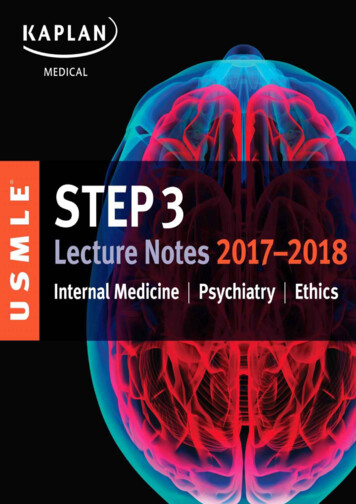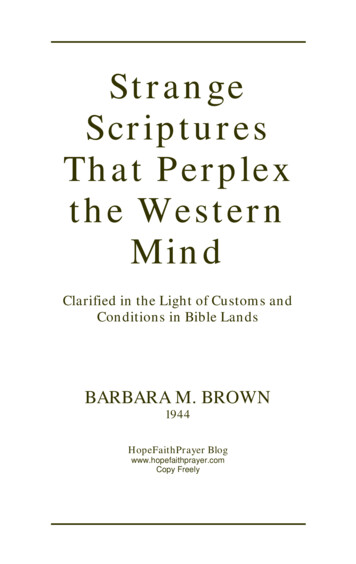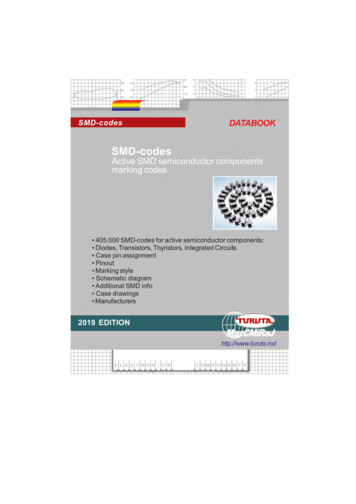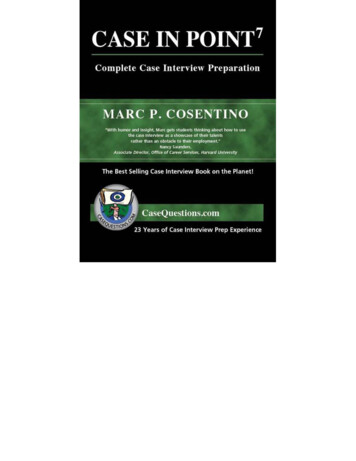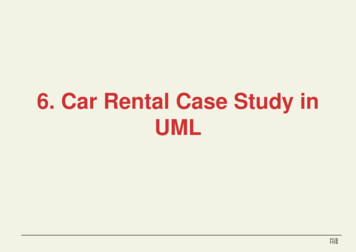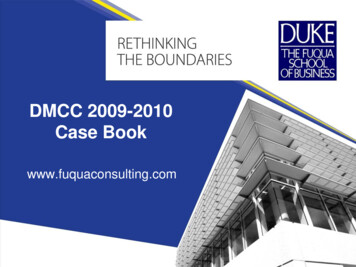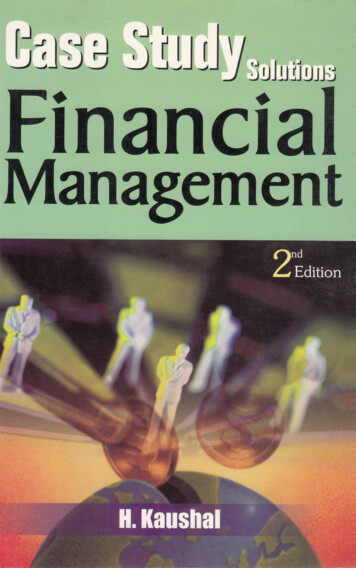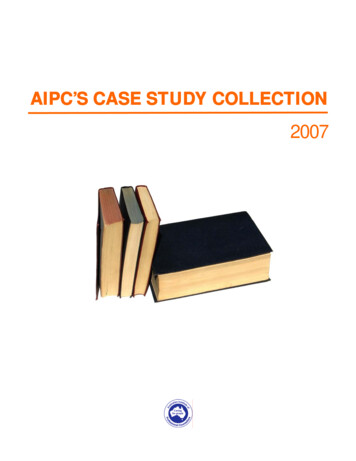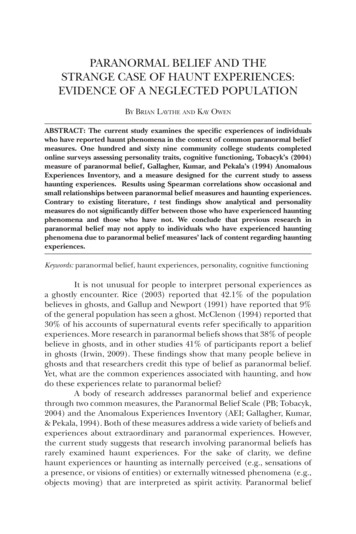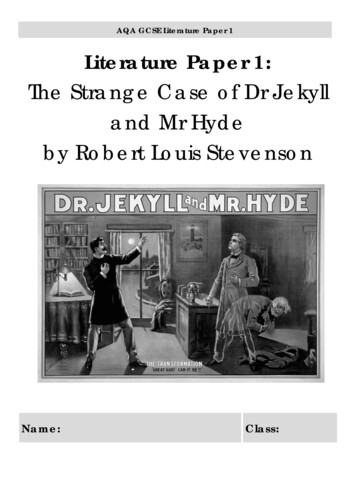
Transcription
AQA GCSE Literature Paper 1Literature Paper 1:The Strange Case of Dr Jekylland Mr Hydeby Robert Louis StevensonName:Class:
CONTENTS:1. Chapter 1: Story of the Door5-14a. Chapter 1 Text5-9b. Chapter 1 Activities10-12c. Chapter 1 Quote Bank13d. Chapter 1 Practice Question142. Chapter 2: Search for Mr Hyde15-27a. Chapter 2 Text15-21b. Chapter 2 Activities22-25c. Chapter 2 Quote Bank26d. Chapter 2 Practice Question273. Chapter 3: Dr Jekyll was Quite at Ease28-33a. Chapter 3 Text28-28b. Chapter 3 Activities30-31c. Chapter 3 Quote Bank32d. Chapter 3 Practice Question334. Chapter 4: The Carew Murder Case34-42a. Chapter 4 Text34-37b. Chapter 4 Activities38-40c. Chapter 4 Quote Bank41d. Chapter 4 Practice Question425. Chapter 5: Incident of the Letter43-51a. Chapter 5 Text43-462
b. Chapter 5 Activities47-49c. Chapter 5 Quote Bank50d. Chapter 5 Practice Question516. Chapter 6: Remarkable Incident of Dr Lanyon52-59a. Chapter 6 Text52-54b. Chapter 6 Activities55-57c. Chapter 6 Quote Bank58d. Chapter 6 Practice Question597. Chapter 7: Incident at the Window60-65a. Chapter 7 Text60-61b. Chapter 7 Activities61-63c. Chapter 7 Quote Bank64d. Chapter 7 Practice Question658. Chapter 8: The Last Night66-82a. Chapter 8 Text66-75b. Chapter 8 Activities76-80c. Chapter 8 Quote Bank81d. Chapter 8 Practice Question829. Chapter 9: Dr Lanyon’s Narrative10.83-92a. Chapter 9 Text83-87b. Chapter 9 Activities88-90c. Chapter 9 Quote Bank91d. Chapter 9 Practice Question92Chapter 10: Henry Jekyll’s Full Statement of the Case93-112a. Chapter 10 Text93-105b. Chapter 10 Activities106-109c. Chapter 10 Quote Bank1103
d. Chapter 10 Practice Question111-11211.Additional Revision Notes: Key Context and Themes113-11712.Notes118-128Chapter 1: The Story of The Door5101520253035MR. UTTERSON the lawyer was a man of a rugged countenance, that wasnever lighted by a smile; cold, scanty and embarrassed in discourse;backward in sentiment; lean, long, dusty, dreary, and yet somehow lovable.At friendly meetings, and when the wine was to his taste, somethingeminently human beaconed from his eye; something indeed which neverfound its way into his talk, but which spoke not only in these silent symbols ofthe after-dinner face, but more often and loudly in the acts of his life. He wasaustere with himself; drank gin when he was alone, to mortify a taste forvintages; and though he enjoyed the theatre, had not crossed the doors ofone for twenty years. But he had an approved tolerance for others;sometimes wondering, almost with envy, at the high pressure of spiritsinvolved in their misdeeds; and in any extremity inclined to help rather than toreprove."I incline to Cain's heresy," he used to say quaintly: "I let my brother go to thedevil in his own way." In this character, it was frequently his fortune to be thelast reputable acquaintance and the last good influence in the lives of downgoing men. And to such as these, so long as they came about his chambers,he never marked a shade of change in his demeanour.No doubt the feat was easy to Mr. Utterson; for he was undemonstrative atthe best, and even his friendship seemed to be founded in a similarcatholicity of good-nature. It is the mark of a modest man to accept hisfriendly circle ready-made from the hands of opportunity; and that was thelawyer's way. His friends were those of his own blood or those whom he hadknown the longest; his affections, like ivy, were the growth of time, theyimplied no aptness in the object. Hence, no doubt, the bond that united himto Mr. Richard Enfield, his distant kinsman, the well-known man about town. Itwas a nut to crack for many, what these two could see in each other, orwhat subject they could find in common. It was reported by those whoencountered them in their Sunday walks, that they said nothing, lookedsingularly dull, and would hail with obvious relief the appearance of a friend.For all that, the two men put the greatest store by these excursions, countedthem the chief jewel of each week, and not only set aside occasions ofpleasure, but even resisted the calls of business, that they might enjoy themuninterrupted.It chanced on one of these rambles that their way led them down a by-streetin a busy quarter of London. The street was small and what is called quiet, but4
40455055it drove a thriving trade on the week-days. The inhabitants were all doingwell, it seemed, and all emulously hoping to do better still, and laying out thesurplus of their gains in coquetry; so that the shop fronts stood along thatthoroughfare with an air of invitation, like rows of smiling saleswomen. Even onSunday, when it veiled its more florid charms and lay comparatively empty ofpassage, the street shone out in contrast to its dingy neighbourhood, like afire in a forest; and with its freshly painted shutters, well-polished brasses, andgeneral cleanliness and gaiety of note, instantly caught and pleased the eyeof the passenger.Two doors from one corner, on the left hand going east, the line was brokenby the entry of a court; and just at that point, a certain sinister block ofbuilding thrust forward its gable on the street. It was two stories high; showedno window, nothing but a door on the lower story and a blind forehead ofdiscoloured wall on the upper; and bore in every feature, the marks ofprolonged and sordid negligence. The door, which was equipped withneither bell nor knocker, was blistered and distained. Tramps slouched intothe recess and struck matches on the panels; children kept shop upon thesteps; the schoolboy had tried his knife on the mouldings; and for close on ageneration, no one had appeared to drive away these random visitors or torepair their ravages.Mr. Enfield and the lawyer were on the other side of the by-street; but whenthey came abreast of the entry, the former lifted up his cane and pointed.60"Did you ever remark that door?" he asked; and when his companion hadreplied in the affirmative, "It is connected in my mind," added he, "with a veryodd story.""Indeed?" said Mr. Utterson, with a slight change of voice, "and what wasthat?"657075"Well, it was this way," returned Mr. Enfield: "I was coming home from someplace at the end of the world, about three o'clock of a black winter morning,and my way lay through a part of town where there was literally nothing tobe seen but lamps. Street after street, and all the folks asleep—street afterstreet, all lighted up as if for a procession and all as empty as a church—till atlast I got into that state of mind when a man listens and listens and begins tolong for the sight of a policeman. All at once, I saw two figures: one a littleman who was stumping along eastward at a good walk, and the other a girlof maybe eight or ten who was running as hard as she was able down a crossstreet. Well, sir, the two ran into one another naturally enough at the corner;and then came the horrible part of the thing; for the man trampled calmlyover the child's body and left her screaming on the ground. It sounds nothing5
80859095100105110115to hear, but it was hellish to see. It wasn't like a man; it was like some damnedJuggernaut. I gave a view-halloa, took to my heels, collared my gentleman,and brought him back to where there was already quite a group about thescreaming child. He was perfectly cool and made no resistance, but gaveme one look, so ugly that it brought out the sweat on me like running. Thepeople who had turned out were the girl's own family; and pretty soon, thedoctor, for whom she had been sent, put in his appearance. Well, the childwas not much the worse, more frightened, according to the Sawbones; andthere you might have supposed would be an end to it. But there was onecurious circumstance. I had taken a loathing to my gentleman at first sight. Sohad the child's family, which was only natural. But the doctor's case was whatstruck me. He was the usual cut-and-dry apothecary, of no particular ageand colour, with a strong Edinburgh accent, and about as emotional as abagpipe. Well, sir, he was like the rest of us; every time he looked at myprisoner, I saw that Sawbones turn sick and white with the desire to kill him. Iknew what was in his mind, just as he knew what was in mine; and killingbeing out of the question, we did the next best. We told the man we couldand would make such a scandal out of this, as should make his name stinkfrom one end of London to the other. If he had any friends or any credit, weundertook that he should lose them. And all the time, as we were pitching itin red hot, we were keeping the women off him as best we could, for theywere as wild as harpies. I never saw a circle of such hateful faces; and therewas the man in the middle, with a kind of black, sneering coolness—frightened too, I could see that—but carrying it off, sir, really like Satan. 'If youchoose to make capital out of this accident,' said he, 'I am naturally helpless.No gentleman but wishes to avoid a scene,' says he. 'Name your figure.' Well,we screwed him up to a hundred pounds for the child's family; he wouldhave clearly liked to stick out; but there was something about the lot of usthat meant mischief, and at last he struck. The next thing was to get themoney; and where do you think he carried us but to that place with thedoor?— whipped out a key, went in, and presently came back with thematter of ten pounds in gold and a cheque for the balance on Coutts's,drawn payable to bearer and signed with a name that I can't mention,though it's one of the points of my story, but it was a name at least very wellknown and often printed. The figure was stiff; but the signature was good formore than that, if it was only genuine. I took the liberty of pointing out to mygentleman that the whole business looked apocryphal, and that a man doesnot, in real life, walk into a cellar door at four in the morning and come out ofit with another man's cheque for close upon a hundred pounds. But he wasquite easy and sneering. 'Set your mind at rest,' says he, 'I will stay with you tillthe banks open and cash the cheque myself.' So we all set off, the doctor,6
120and the child's father, and our friend and myself, and passed the rest of thenight in my chambers; and next day, when we had breakfasted, went in abody to the bank. I gave in the check myself, and said I had every reason tobelieve it was a forgery. Not a bit of it. The cheque was genuine.""Tut-tut," said Mr. Utterson.125130"I see you feel as I do," said Mr. Enfield. "Yes, it's a bad story. For my man was afellow that nobody could have to do with, a really damnable man; and theperson that drew the cheque is the very pink of the proprieties, celebratedtoo, and (what makes it worse) one of your fellows who do what they callgood. Black-mail, I suppose; an honest man paying through the nose forsome of the capers of his youth. Black-Mail House is what I call that placewith the door, in consequence. Though even that, you know, is far fromexplaining all," he added, and with the words fell into a vein of musing.From this he was recalled by Mr. Utterson asking rather suddenly:"And you don't know if the drawer of the cheque lives there?""A likely place, isn't it?" returned Mr. Enfield. "But I happen to have noticed hisaddress; he lives in some square or other."135140"And you never asked about the—place with the door?" said Mr.Utterson."No, sir: I had a delicacy," was the reply. "I feel very strongly about puttingquestions; it partakes too much of the style of the day of judgment. You starta question, and it's like starting a stone. You sit quietly on the top of a hill; andaway the stone goes, starting others; and presently some bland old bird (thelast you would have thought of) is knocked on the head in his own backgarden and the family have to change their name. No, sir, I make it a rule ofmine: the more it looks like Queer Street, the less I ask.""A very good rule, too," said the lawyer.145150"But I have studied the place for myself," continued Mr. Enfield. "It seemsscarcely a house. There is no other door, and nobody goes in or out of thatone but, once in a great while, the gentleman of my adventure. There arethree windows looking on the court on the first floor; none below; thewindows are always shut but they're clean. And then there is a chimneywhich is generally smoking; so somebody must live there. And yet it's not sosure; for the buildings are so packed together about that court, that it's hardto say where one ends and another begins."The pair walked on again for a while in silence; and then,"Enfield," said Mr. Utterson, "that's a good rule of yours."7
"Yes, I think it is," returned Enfield.155"But for all that," continued the lawyer, "there's one point I want to ask: I wantto ask the name of that man who walked over the child.""Well," said Mr. Enfield, "I can't see what harm it would do. It was a man of thename of Hyde.""H'm," said Mr. Utterson. "What sort of a man is he to see?"160165"He is not easy to describe. There is something wrong with his appearance;something displeasing, something downright detestable. I never saw a man Iso disliked, and yet I scarce know why. He must be deformed somewhere; hegives a strong feeling of deformity, although I couldn't specify the point. He'san extraordinary-looking man, and yet I really can name nothing out of theway. No, sir; I can make no hand of it; I can't describe him. And it's not wantof memory; for I declare I can see him this moment."Mr. Utterson again walked some way in silence and obviously under a weightof consideration."You are sure he used a key?" he inquired at last.170"My dear sir " began Enfield, surprised out of himself."Yes, I know," said Utterson; "I know it must seem strange. The fact is, if I do notask you the name of the other party, it is because I know it already. You see,Richard, your tale has gone home. If you have been inexact in any point, youhad better correct it."175180"I think you might have warned me," returned the other, with a touch ofsullenness. "But I have been pedantically exact, as you call it. The fellow hada key; and what's more, he has it still. I saw him use it, not a week ago."Mr. Utterson sighed deeply but said never a word; and the young manpresently resumed. "Here is another lesson to say nothing," said he. "I amashamed of my long tongue. Let us make a bargain never to refer to thisagain.""With all my heart," said the lawyer. "I shake hands on that, Richard."8
Chapter 1 Activitiesa) Vocabulary Match-UpWord1. countenanceDefinitiona) in the Bible, Cain (who hadmurdered his brother) asked ‘Am Imy brother’s keeper?’2. discourseb) notice3. backward in sentimentc) lack of care and maintenance4. austered) conversation5. mortify a taste for vintagese) stained6. Cain’s heresy7. Negligencef) Creatures from Greek mythology –half woman, half birdg) A slang expression meaning‘getting into trouble’ or ‘debt’8. Distainedh) Agreed9. Remarki) A huge creature or machine thatcrushes all before it10. Replied in the affirmativej) Said ‘yes’11. Juggernautk) The huntsman’s shout when the foxis sighted12. View halloal) Face13. Sawbonesm) Reputation, good name14. Apothecaryn) Person who prepares or sellsmedicines (a low-paid doctor)15. Credito) Strict16. Harpiesp) Slang for doctor17. Struckq) Slow to show emotion18. Queer streetr) Extra careful about the details19. Pedantically exacts) Get rid of his love for good wine9
b) Chapter 1 Cloze ActivityFill in the blanks to test your knowledge on what happens in each chapterMr Utterson is a boring but ‘loveable’ lawyer who people get help from whenthey are in . He is friends with a cousin, Enfield, and goes onregular walks with him on Sundays. One Sunday, they pass a dirtyin a poor area. Enfield tells Utterson a story about the door and the man thatlives behind it. He says he saw a small, revolting man a smallat 3am in the morning. A crowd, led by Enfield, confronted the manand forced him to pay in compensation. The man gave them acheque, which we learn at the very end of the chapter was signed by- a very person. No one believed thatthe cheque was but they later found out that it was. Utterson isworried that Jekyll is being by Mr Hyde.Henry Jekyllrespectablegenuineblackmaileddoortrample ontrouble 100girlc) Chapter 1 Short Answer Questions:1. Re-read lines 1-25. What sort of person is Mr Utterson? How doesStevenson use language to present him as a typical Victorian gentleman?2. Re-read lines 26-45. What is Mr Utterson’s relationship to Mr Enfield? Howare the two men alike? How are they different?10
3. Re-read the description of the door (ll. 46-56). How does Stevenson usesetting to convey a sense of Mr Hyde’s character before we meet him?4. Re-read Mr Enfield’s account of meeting Mr Hyde (ll. 64-120). How doesStevenson use language here to create the impression that Hyde is an eviland immoral character? (Choose three short quotes to analyse.)5. What is surprising about the cheque that Hyde gives the family? Why is thissignificant to the story?6. Re-read ll. 121-182. Why do you think Stevenson opens the novel with thischapter? How does it help to create a sense of mystery for the reader?11
d) Chapter 1 Quotation BankConnotations or EffectQuotationCHAPTER 1: STORY OF THE DOORSocial/Historical ContextChoose 5 significant quotations from Chapter 1 to memorise.12
e) Chapter 1 Practice QuestionRead the following extract from Chapter 1 and then answer the question thatfollows.In this extract Mr Enfield describes his encounter with Mr Hyde.51015202507"Well, it was this way," returned Mr. Enfield: "I was coming home fromsome place at the end of the world, about three o'clock of a blackwinter morning, and my way lay through a part of town where therewas literally nothing to be seen but lamps. Street after street, and allthe folks asleep—street after street, all lighted up as if for aprocession and all as empty as a church—till at last I got into thatstate of mind when a man listens and listens and begins to long forthe sight of a policeman. All at once, I saw two figures: one a littleman who was stumping along eastward at a good walk, and theother a girl of maybe eight or ten who was running as hard as shewas able down a cross street. Well, sir, the two ran into one anothernaturally enough at the corner; and then came the horrible part ofthe thing; for the man trampled calmly over the child's body and lefther screaming on the ground. It sounds nothing to hear, but it washellish to see. It wasn't like a man; it was like some damnedJuggernaut. I gave a view-halloa, took to my heels, collared mygentleman, and brought him back to where there was already quitea group about the screaming child. He was perfectly cool andmade no resistance, but gave me one look, so ugly that it broughtout the sweat on me like running. The people who had turned outwere the girl's own family; and pretty soon, the doctor, for whom shehad been sent, put in his appearance. Well, the child was not muchthe worse, more frightened, according to the Sawbones; and thereyou might have supposed would be an end to it. But there was onecurious circumstance. I had taken a loathing to my gentleman atfirst sight. So had the child's family, which was only natural. But thedoctor's case was what struck me.Starting with this extract, how does Stevenson present Mr Hyde asnaturally evil?Write about:o How Stevenson presents Mr Hyde in this extracto How Stevenson presents Mr Hyde as naturally evil in the novel as awhole.[30 marks]13
Chapter 2: Search for Mr Hyde0510152025THAT evening Mr. Utterson came home to his bachelor house in sombre spiritsand sat down to dinner without relish. It was his custom of a Sunday, when thismeal was over, to sit close by the fire, a volume of some dry divinity on hisreading-desk, until the clock of the neighbouring church rang out the hour oftwelve, when he would go soberly and gratefully to bed. On this night,however, as soon as the cloth was taken away, he took up a candle andwent into his business-room. There he opened his safe, took from the mostprivate part of it a document endorsed on the envelope as Dr. Jekyll's Will,and sat down with a clouded brow to study its contents. The will washolograph, for Mr. Utterson, though he took charge of it now that it wasmade, had refused to lend the least assistance in the making of it; it providednot only that, in case of the decease of Henry Jekyll, M.D., D.C.L., L.L.D., F.R.S.,etc., all his possessions were to pass into the hands of his "friend andbenefactor Edward Hyde," but that in case of Dr. Jekyll's "disappearance orunexplained absence for any period exceeding three calendar months," thesaid Edward Hyde should step into the said Henry Jekyll's shoes without furtherdelay and free from any burthen or obligation, beyond the payment of a fewsmall sums to the members of the doctor's household. This document hadlong been the lawyer's eyesore. It offended him both as a lawyer and as alover of the sane and customary sides of life, to whom the fanciful was theimmodest. And hitherto it was his ignorance of Mr. Hyde that had swelled hisindignation; now, by a sudden turn, it was his knowledge. It was already badenough when the name was but a name of which he could learn no more. Itwas worse when it began to be clothed upon with detestable attributes; andout of the shifting, insubstantial mists that had so long baffled his eye, thereleaped up the sudden, definite presentment of a fiend."I thought it was madness," he said, as he replaced the obnoxious paper inthe safe, "and now I begin to fear it is disgrace."3035With that he blew out his candle, put on a great-coat, and set forth in thedirection of Cavendish Square, that citadel of medicine, where his friend, thegreat Dr. Lanyon, had his house and received his crowding patients. "If anyone knows, it will be Lanyon," he had thought.The solemn butler knew and welcomed him; he was subjected to no stage ofdelay, but ushered direct from the door to the dining-room where Dr. Lanyonsat alone over his wine. This was a hearty, healthy, dapper, red-facedgentleman, with a shock of hair prematurely white, and a boisterous anddecided manner. At sight of Mr. Utterson, he sprang up from his chair andwelcomed him with both hands. The geniality, as was the way of the man,14
40was somewhat theatrical to the eye; but it reposed on genuine feeling. Forthese two were old friends, old mates both at school and college, boththorough respecters of themselves and of each other, and, what does notalways follow, men who thoroughly enjoyed each other's company.After a little rambling talk, the lawyer led up to the subject which sodisagreeably pre-occupied his mind.45"I suppose, Lanyon," said he "you and I must be the two oldest friends thatHenry Jekyll has?""I wish the friends were younger," chuckled Dr. Lanyon. "But I suppose we are.And what of that? I see little of him now.""Indeed?" said Utterson. "I thought you had a bond of common interest."505560"We had," was the reply. "But it is more than ten years since Henry Jekyllbecame too fanciful for me. He began to go wrong, wrong in mind; andthough of course I continue to take an interest in him for old sake's sake, asthey say, I see and I have seen devilish little of the man. Such unscientificbalderdash," added the doctor, flushing suddenly purple, "would haveestranged Damon and Pythias."This little spirit of temper was somewhat of a relief to Mr. Utterson. "They haveonly differed on some point of science," he thought; and being a man of noscientific passions (except in the matter of conveyancing), he even added:"It is nothing worse than that!" He gave his friend a few seconds to recover hiscomposure, and then approached the question he had come to put. "Didyou ever come across a protege of his—one Hyde?" he asked."Hyde?" repeated Lanyon. "No. Never heard of him. Since my time."657075That was the amount of information that the lawyer carried back with him tothe great, dark bed on which he tossed to and fro, until the small hours of themorning began to grow large. It was a night of little ease to his toiling mind,toiling in mere darkness and besieged by questions.Six o'clock struck on the bells of the church that was so conveniently near toMr. Utterson's dwelling, and still he was digging at the problem. Hitherto it hadtouched him on the intellectual side alone; but now his imagination also wasengaged, or rather enslaved; and as he lay and tossed in the gross darknessof the night and the curtained room, Mr. Enfield's tale went by before hismind in a scroll of lighted pictures. He would be aware of the great field oflamps of a nocturnal city; then of the figure of a man walking swiftly; then ofa child running from the doctor's; and then these met, and that humanJuggernaut trod the child down and passed on regardless of her screams. Orelse he would see a room in a rich house, where his friend lay asleep,15
80859095100dreaming and smiling at his dreams; and then the door of that room wouldbe opened, the curtains of the bed plucked apart, the sleeper recalled, andlo! there would stand by his side a figure to whom power was given, andeven at that dead hour, he must rise and do its bidding. The figure in thesetwo phases haunted the lawyer all night; and if at any time he dozed over, itwas but to see it glide more stealthily through sleeping houses, or move themore swiftly and still the more swiftly, even to dizziness, through widerlabyrinths of lamplighted city, and at every street-corner crush a child andleave her screaming. And still the figure had no face by which he might knowit; even in his dreams, it had no face, or one that baffled him and meltedbefore his eyes; and thus it was that there sprang up and grew apace in thelawyer's mind a singularly strong, almost an inordinate, curiosity to behold thefeatures of the real Mr. Hyde. If he could but once set eyes on him, hethought the mystery would lighten and perhaps roll altogether away, as wasthe habit of mysterious things when well examined. He might see a reason forhis friend's strange preference or bondage (call it which you please) andeven for the startling clause of the will. At least it would be a face worthseeing: the face of a man who was without bowels of mercy: a face whichhad but to show itself to raise up, in the mind of the unimpressionable Enfield,a spirit of enduring hatred. "But for all that," continued the lawyer, "there's onepoint I want to ask: I want to ask the name of that man who walked over thechild.""Well," said Mr. Enfield, "I can't see what harm it would do. It was a man of thename of Hyde.""H'm," said Mr. Utterson. "What sort of a man is he to see?"105110"He is not easy to describe. There is something wrong with his appearance;something displeasing, something downright detestable. I never saw a man Iso disliked, and yet I scarce know why. He must be deformed somewhere; hegives a strong feeling of deformity, although I couldn't specify the point. He'san extraordinary-looking man, and yet I really can name nothing out of theway. No, sir; I can make no hand of it; I can't describe him. And it's not wantof memory; for I declare I can see him this moment."Mr. Utterson again walked some way in silence and obviously under a weightof consideration."You are sure he used a key?" he inquired at last."My dear sir " began Enfield, surprised out of himself."Yes, I know," said Utterson; "I know it must seem strange. The fact is, if I do notask you the name of the other party, it is because I know it already. You see,16
115Richard, your tale has gone home. If you have been inexact in any point, youhad better correct it.""I think you might have warned me," returned the other, with a touch ofsullenness. "But I have been pedantically exact, as you call it. The fellow hada key; and what's more, he has it still. I saw him use it, not a week ago."120Mr. Utterson sighed deeply but said never a word; and the young manpresently resumed. "Here is another lesson to say nothing," said he. "I amashamed of my long tongue. Let us make a bargain never to refer to thisagain.""With all my heart," said the lawyer. "I shake hands on that, Richard."125From that time forward, Mr. Utterson began to haunt the door in the by-streetof shops. In the morning before office hours, at noon when business wasplenty, and time scarce, at night under the face of the fogged city moon, byall lights and at all hours of solitude or concourse, the lawyer was to be foundon his chosen post.130"If he be Mr. Hyde," he had thought, "I shall be Mr. Seek."135140145150And at last his patience was rewarded. It was a fine dry night; frost in the air;the streets as clean as a ballroom floor; the lamps, unshaken, by any wind,drawing a regular pattern of light and shadow. By ten o'clock, when theshops were closed, the by-street was very solitary and, in spite of the lowgrowl of London from all round, very silent. Small sounds carried far; domesticsounds out of the houses were clearly audible on either side of the roadway;and the rumour of the approach of any passenger preceded him by a longtime. Mr. Utterson had been some minutes at his post, when he was aware ofan odd, light footstep drawing near. In the course of his nightly patrols, hehad long grown accustomed to the quaint effect with which the footfalls of asingle person, while he is still a great way off, suddenly spring out distinct fromthe vast hum and clatter of the city. Yet his attention had never before beenso sharply and decisively arrested; and it was with a strong, superstitiousprevision of success that he withdrew into the entry of the court.The steps drew swiftly nearer, and swelled out suddenly louder as they turnedthe end of the street. The lawyer, looking forth from the entry, could soon seewhat manner of man he had to deal with. He was small and very plainlydressed, and the look of him, even at that distance, went somehow strong
people who had turned out were the girl's own family; and pretty soon, the doctor, for whom she had been sent, put in his appearance. Well, the child was not much the worse, more frightened, according to the Sawbones; and there you might have supposed would be
